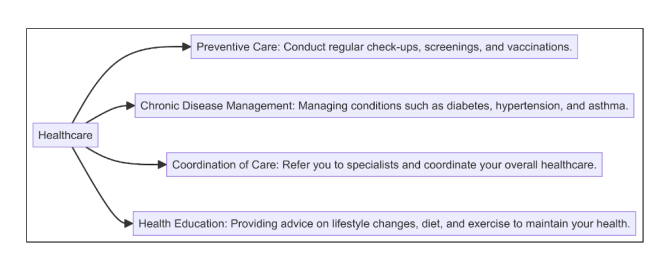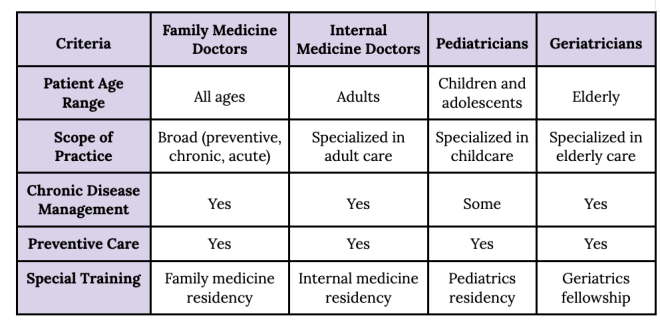- Change theme
Choosing the Right Primary Care Doctor: Your Complete Guide
Finding the right healthcare partner can be daunting, but it's a vital step in ensuring your long-term health and well-being.
23:31 05 August 2024
Are you feeling overwhelmed by the thought of choosing a primary care doctor? You're not alone. Finding the right healthcare partner can be daunting, but it's a vital step in ensuring your long-term health and well-being.
Whether you're seeking preventive care, managing a chronic condition, or just need someone to guide you through the healthcare maze, the right primary care doctor can make all the difference. Let's dive into how you can make this important decision with confidence.
Why Choosing the Right Primary Care Doctor Matters
A primary care doctor is more than just a physician who treats your immediate health concerns. They play a vital role in:

The right primary care doctor can significantly impact your health outcomes. They offer continuity of care, which means they understand your medical history and can provide personalized care.
Studies have shown that having a consistent primary care provider is associated with better health outcomes, reduced hospitalizations, and lower healthcare costs.
Types of Primary Care Doctors
Family Medicine Doctors
Family medicine doctors provide comprehensive care for individuals of all ages, from newborns to the elderly. They are trained in a wide range of medical issues and can treat most conditions. They are ideal for families looking for a single doctor to treat everyone.
Internal Medicine Doctors
Internal medicine doctors, or internists, specialize in the care of adults. They are well-versed in treating complex medical conditions and chronic illnesses. They are an excellent choice for adults seeking a doctor with expertise in managing multiple health issues.
Pediatricians
Pediatricians specialize in the care of children from birth through adolescence. They are trained to handle the unique medical needs of children and provide preventive care, vaccinations, and developmental monitoring.
Geriatricians
Geriatricians focus on the health care of elderly patients. They are skilled in managing the complex health issues that often arise with aging, such as multiple chronic conditions, cognitive decline, and mobility issues.

Factors to Consider When Choosing a Primary Care Doctor
Identify Your Needs
Start by identifying your specific health needs. Consider factors such as your age and gender. Choosing a doctor who specializes in your demographic group can provide tailored care. If you have chronic conditions, it’s crucial to look for a doctor with experience in managing them effectively.
Additionally, think about your personal preferences regarding the doctor's gender, language, and cultural competence. To find suitable options, try searching for "primary care physicians near me." These aspects can significantly influence your comfort level and the quality of communication with your healthcare provider.
Research Potential Doctors
To research potential doctors, utilize online directories like Healthgrades, Zocdoc, and Vitals, which offer detailed profiles and reviews of doctors. Your insurance provider’s website is another valuable resource, providing a list of in-network doctors.
Professional organizations, such as the American Medical Association, also maintain directories of board-certified doctors. These resources can help you compile a list of potential candidates who meet your initial criteria.
Verify Credentials and Background
Once you have a list of potential doctors, it's essential to verify their credentials and background. Confirm their board certification status through the American Board of Medical Specialties (ABMS) to ensure they meet the necessary professional standards.
Check their medical license status through your state’s medical board, and investigate any disciplinary actions or malpractice claims. This step ensures that you choose a reputable and qualified healthcare provider.
Schedule a Consultation
Before making a final decision, schedule a consultation with the doctor. This meeting allows you to assess compatibility by determining if you feel comfortable with the doctor's communication style and approach to care. Use this opportunity to ask questions about their experience, office policies, and availability.
Additionally, evaluate the office environment for cleanliness, organization, and professionalism of the staff. These factors can provide insights into the overall quality of care you can expect.
Make Your Decision
After the consultation, consider all the factors you’ve gathered. Choose a doctor who meets your needs, makes you feel comfortable, and aligns with your health goals. The right primary care doctor will not only address your current health concerns but also support your long-term well-being.
When to Consider Changing Your Primary Care Doctor
Signs It’s Time for a Change
There may come a time when you need to consider changing your primary care doctor. Some signs include:
- Poor Communication: If the doctor doesn't listen to your concerns or explain things clearly.
- Lack of Availability: Difficulty scheduling appointments or long wait times.
- Discomfort: If you feel uncomfortable or not respected by the doctor or office staff.
- Ineffective Care: If your health issues are not being effectively managed.
How to Change Your Doctor
If you decide to change your primary care doctor, follow these steps:
- Find a New Doctor: Use the steps outlined earlier to find a new primary care doctor.
- Transfer Medical Records: Request your medical records be transferred to your new doctor.
- Notify Your Insurance: Inform your insurance provider about the change.
Building a Relationship with Your Primary Care Doctor
- Establishing Trust: Building a strong relationship with your primary care doctor is crucial. Trust and open communication are the foundation of effective healthcare. Be honest about your health concerns, lifestyle, and habits.
- Regular Check-Ups: Schedule regular check-ups even if you feel healthy. Preventive care is essential for early detection of potential health issues and maintaining overall wellness.
- Follow Treatment Plans: Adhere to the treatment plans and advice provided by your doctor. This includes taking prescribed medications, following lifestyle recommendations, and attending follow-up appointments.
- Stay Informed: Take an active role in your healthcare by staying informed. Ask questions about your condition, treatment options, and any concerns you may have. The more you know, the better you can manage your health.
Conclusion
Feeling more confident about choosing the right primary care doctor? It can be a game-changer for your health and peace of mind. Remember, this isn't just about finding a doctor; it's about finding a partner who understands your health journey and supports you every step of the way.
Take your time, consider your needs, and don't hesitate to switch if you feel your current doctor isn't the right fit. Your health deserves the best, and with the right primary care doctor, you'll be well on your way to achieving it.
Key Takeaways
- Primary care doctors provide preventive services and chronic disease management, ensuring personalized healthcare.
- Consider credentials, communication style, accessibility, and insurance compatibility when selecting a doctor.
- Understand the differences between family medicine, internal medicine, pediatrics, and geriatrics to find the right specialist for your needs.
- Establish trust, schedule regular check-ups, follow treatment plans, and stay informed to maintain a strong relationship with your doctor.
- Recognize the signs that it might be time to change your primary care doctor and understand how to transition smoothly for continuous, effective care.
Frequently Asked Questions
- When should I consider changing my primary care doctor?
Consider changing your doctor if you experience poor communication, lack of availability, discomfort, or if your health issues are not being effectively managed.
- How can I verify a doctor's credentials?
You can verify a doctor's credentials by checking their board certification through the American Board of Medical Specialties (ABMS) and their medical license status through your state's medical board.
- What should I consider when choosing a primary care doctor?
Key considerations include the doctor's credentials, experience, communication style, accessibility, and whether they are in-network with your health insurance.
- How do I build a good relationship with my primary care doctor?
Building a good relationship involves establishing trust, being honest about your health concerns, following treatment plans, and staying informed about your health.
